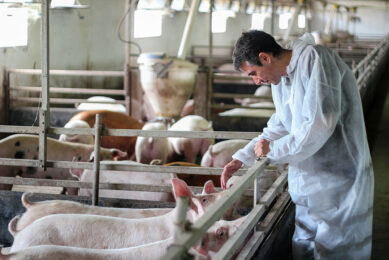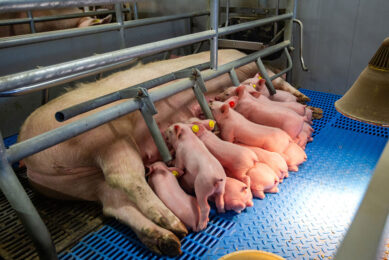Chelated trace minerals boost piglet immunity and growth
![At weaning, piglets face a difficult time with ( various challenges coming their way. [Photo: Henk Riswick]](https://www.pigprogress.net/app/uploads/2021/04/002_621_rb-image-2693750-848x565.jpeg)
Trace minerals are known to benefit animal health in various ways, as they ?play many roles in piglet health and development. This goes beyond proper ?nutritional maintenance, effects on e.g. M. hyo infections and an improved ?FCR are observed.
For decades, the global swine industry fed low levels of certain antibiotics to pigs to maintain gut health and improve growth. However, concerns about antibiotic resistance in humans and antibiotic use in animals have resulted in tightening regulations, which have minimised or completely eliminated the use of many antibiotics in feed.
Stress and disease continue to challenge pig health, especially weaned pigs struggling with a new environment, pen mates and feed source. The industry is seeking new ways to improve young pig growth without antibiotics. Growing evidence suggests trace mineral requirements in piglets are not consistently met by feeding inorganic forms of these minerals. Therefore, studies investigating the impact of organic trace minerals on immunity are being considered as a means to maximise pig health and growth.
Minerals’ role in pig health
Essential trace minerals such as zinc, copper and manganese play a wide variety of roles in piglet health and development. Providing a more bioavailable source of organic trace minerals can exert positive effects, including improved immune response, reduced oxidative stress and enhanced bone and tissue development. And, the amount of trace minerals can be met at lower rates in the diet, reducing excretion into the environment.
Zinc is essential for pig health and development. It is involved in the regulation of DNA transcription. Hundreds of enzymes related to growth and health in pigs require zinc for their normal structure and function. Pigs deficient in zinc show poor growth, decreased feed intake and impaired immune system.
Copper is necessary for red blood cells to form and deficiencies can lead to anaemia. Furthermore, if copper is removed from creep diets, piglets can experience diarrhoea, bacterial enteritis and poor growth.
Manganese is important in enzyme production, development of bone and cartilage, energy metabolism, oxidative balance and health.
The immune system is one of the most responsive systems to mineral status. Studies indicate feeding a mineral deficient diet can result in reduced weight gain and a more immune challenged piglet. One study showed diseases are more detrimental in mineral deficient animals, and the feeding of organic trace minerals provided better performance and mineral status following a disease challenge.
Improved immune response
In a study, replacement gilts were fed diets supplemented with zinc, copper and manganese, either as inorganic trace minerals or an equal mixture of inorganic trace minerals and methionine analog chelated minerals fed as ‘metal methionine hydroxyl analog chelate’ (MMHAC, Mintrex chelated trace minerals by Novus International). Gilts were vaccinated with a commercial vaccine for Mycoplasma hyopneumoniae on weeks 0 and 2 post-weaning and bled for antibody titres on weeks 0, 2, 4, 8 and 12. While both groups of gilts achieved a similar titre by 12 weeks, gilts supplemented with MMHAC minerals reached a positive titre eight weeks prior to gilts fed the control diet (Figure 1).
Data suggests that during those eight weeks, replacement gilts fed inorganic trace minerals were not as protected against M. hyopneumoniae as gilts fed the MMHAC source, and thus the MMHAC source provided a boost to gilts’ immune systems.
In another study, designed to test if zinc can affect the response to coccidiosis vaccination and challenge, animals were vaccinated on day 0 while being fed a zinc-deficient basal diet, zinc sulfate (ZnSO4), ZnMet or Zn as MMHAC, all at dietary levels of 40 ppm of zinc. Results indicated zinc supplementation improved performance of vaccinated animals. The study also indicated antibodies to antigens were significantly higher in animals fed MMHAC.
Poor oxidative stress management in piglets can result in decreased performance, compromised immune function and also increased morbidity. It is important to understand that trace minerals are critical in managing oxidative stress. Animals fed MMHAC showed significantly lower levels of lipid hydroperoxides in their blood versus animals fed other mineral sources, indicating lower oxidative stress in animals fed MMHAC.
Improved FCR
Mineral supplementation in pig diets is crucial for animal growth and health. However, the use of high inclusion rates of inorganic trace minerals are largely excreted by the animal. Diets formulated with the right source of minerals for the best absorption in the gut will improve gut health, resulting in a better feed conversion rate and a more economical feeding strategy.
In a study carried out to measure digestibility and retention of zinc, copper and manganese in pigs fed inorganic or MMHAC sources, results indicate Zn, Cu and Mn from MMHAC have greater digestibility and retention rates compared with inorganic sulfates when included in a corn–soybean meal diet.
A meta-analysis of six trials evaluated the effect of different levels of copper from either Cu MMHAC or CuSO4 on nursery pig growth performance. Results indicated average daily gain responded with increasing copper supplementation, and the Cu MMHAC source of copper reached higher plateau compared to the inorganic source (Figure 2). The linear slope for increasing copper supplementation for gain efficiency was 2.1-fold higher for Cu MMHAC than that of CuSO4 (Figure 3).
Piglets are challenged by a changing diet, pen moves, cross fostering, as well as viruses, damaging gut flora and other disease exposure. Luckily, the immune system is among the most responsive to mineral status, and there’s no question that chelated mineral supplementation with MMHAC can improve pig health. Better gut health can improve rate of gain and also overall feed efficiency, which ultimately increases profitability.
Join 18,000+ subscribers
Subscribe to our newsletter to stay updated about all the need-to-know content in the pigsector, three times a week. Beheer
Beheer





 WP Admin
WP Admin  Bewerk bericht
Bewerk bericht